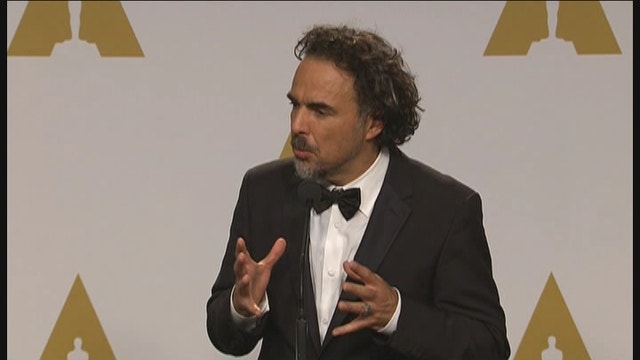González Iñárritu: 'Fear is the condom of life'
Alejandro González Iñárritu has won the Oscar for best director for Birdman at the 87th Academy Awards.
Alejandro González Iñárritu and Emmanuel Lubezki are flying high.
The Mexican filmmaking duo made history at Sunday night’s Oscars by taking home four awards for best film, best director, best original screenplay and best cinematographer for “Birdman.”
The film, whose complete title is “Birdman (or The Unexpected Virtue of Ignorance),” beat out the likes of “Boyhood,” and “Selma,” and became film with the longest name to ever win the Best Picture category.
"Maybe next year the government will inflict immigration restrictions," said González Iñárritu, recalling last year's best director winner, Alfonso Cuarón. "Two Mexicans in a row. That's suspicious, I guess."
González Iñárritu, sporting a larger-than-life figure of frizzy hair, concluded the night's many moving speeches calling for social change.
“I want to dedicate this award to my fellow Mexicans, the ones who live in Mexico. I pray that we can find and build a government that we deserve,” he said. “And the ones who live in this country, who are part of the latest generation of immigrants in this country, I just pray that they can be treated with the same dignity and respect as the ones that came before and built this incredible immigrant nation.”
González Iñárritu, who had previously been nominated for his 2007 film “Babel,” became the second Latino (and Mexican) filmmaker to win best director, following in the footsteps of his co-patriot Cuarón, who won last year for his space thriller, “Gravity.”
“Ego loves competition, because for someone to win, someone has to lose. But the paradox is that true art can’t be compared, can’t be labelled, can’t be defeated. My work and the work of my fellow nominees will be judged only by time,” he said collecting the award for best director.
Winning best cinematographer for “Birdman,” Lubezki became the first ever cinematographer to win back-to-back Oscars in the category. He won last year for his work in “Gravity,” and had been nominated six times before.
“Wow, this is extraordinary,” he said during his brief acceptance speech. “I want to especially give thanks to my friend, Alejandro González Iñárritu.”
Lubezki, 51, who is widely known as "Chivo," won every major critic award this season for his execution of the continuous-shot style in “Birdman” – which he said “sounded like a nightmare” when he first read the script.
“But Alejandro captivated me, and I truly wanted to do the movie. It was really hard. It was an experiment. He’s a very strong, very curious artist,” he said backstage. “This was probably the hardest movie I’ve ever worked on because the shots were very long, and we were not doing ‘coverage.’ That brought an energy to the movie that it otherwise would not have had.
The ceremony, hosted by Tony Award veteran Neil Patrick Harris, was punctuated by passionate pleas for equality and bristled with heartfelt speeches about women's rights, immigration, suicide prevention and race.
The awards that overwhelmingly went to less-seen independent films, were spread around. All eight of the best-picture nominees won awards, including Eddie Redmayne for best actor for his technically nuanced performance as Stephen Hawking in "The Theory of Everything."
"Please know this that I am fully aware that I am a lucky, lucky man," said Redmayne. "This belongs to all of the people around the world battling ALS."
All of Sunday's acting winners were first-timers, including best actress-winner Julianne Moore, who won for her performance as an academic with early-onset Alzheimers in "Still Alice."
"I read an article that said that winning an Oscar could lead to living five years longer," said Moore. "If that's true, I'd really like to thank the academy because my husband is younger than me.”
Harris gave the Academy Awards a cheery tone that sought to celebrate Hollywood while also slyly parodying it. "Tonight we honor Hollywood's best and whitest — I mean brightest," he began the night, alluding to the much-discussed lack of diversity in this year's acting nominees.
It was the first salvo in a night that often reverberated with heartfelt calls for change.
"To every woman who gave birth, to every taxpayer and citizen of this nation," said Arquette. "We have fought for everybody else's equal rights. It's our time to have wage equality once for all. And equal rights for women in the United States of America.”
The Associated Press contributed to this report.







